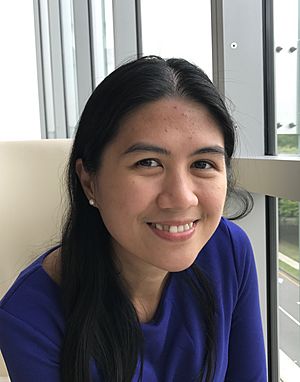Jacquiline Romero facts for kids
Quick facts for kids
Jacqui Romero
|
|
|---|---|
 |
|
| Born |
Mary Jacquiline Romero
|
| Nationality | Filipino |
| Education | Philippine Science High School |
| Alma mater | University of the Philippines (BSc, MSc) University of Glasgow (PhD) |
| Scientific career | |
| Fields | Optics Quantum optics Entanglement Orbital angular momentum |
| Institutions | University of the Philippines University of Glasgow University of Queensland |
| Thesis | Orbital angular momentum entanglement (2012) |
| Doctoral advisor | Miles J. Padgett Stephen Barnett |
Mary Jacquiline Romero is a brilliant scientist from the Philippines. She is a quantum physicist who studies tiny particles of light called photons. Dr. Romero works at the University of Queensland in Australia.
Her research helps us understand how the universe works at a very small scale. She also explores how we can use quantum physics to create new technologies. This includes making super-secure ways to send information and building new types of computers.
Contents
Becoming a Scientist
Jacqui Romero loved physics when she was in high school. She went to the Philippine Science High School. After that, she studied at the University of the Philippines. She earned both her Bachelor's and Master's degrees in physics there.
For her Master's degree, she learned how to change the shape of light. She used special tools called spatial light modulators (SLMs). These tools can control light for things like microscopy.
Later, Dr. Romero moved to the United Kingdom. She earned her PhD at the University of Glasgow. Her PhD research focused on how light particles can be "entangled." This means they are connected in a special quantum way. She also used SLMs to control single photons.
Amazing Discoveries
After her PhD, Dr. Romero continued her research in Glasgow. She and her team made an exciting discovery. They found a way to slow down light particles in open space. This was big news in the science world!
In 2015, she moved to Brisbane, Australia. She joined the University of Queensland. Here, she kept working on quantum physics.
Quantum Alphabets
Dr. Romero's work often involves "quantum alphabets." Imagine our regular computers use only two options, like 0 or 1, to store information. Dr. Romero wants to put much more information into a single photon. This is like creating a super-long alphabet instead of just two letters.
This research is very important for the future. It could lead to much safer ways to send secret messages online. It could also help us store huge amounts of data more efficiently.
Brain-Inspired Computers
Dr. Romero is also working on a new kind of computer. It is inspired by how the human brain works. She uses quantum light to try and build this "brain-inspired" computer. This research could help us understand both our brains and how to make even smarter computers.
Awards and Recognition
Dr. Romero has received many awards for her amazing work. These awards show how important her research is in the world of science.
- 2019 Westpac Research Fellow
- 2019 L’Oréal-UNESCO For Women in Science program International Rising Talent Prize
- 2018 Ruby Payne-Scott medal from the Australian Institute of Physics
- 2018 UQ Early Career Researcher Award for Photonic neuromorphic computing
- 2018 Queensland Young Tall Poppy Award
- 2018 Japan Society for the Promotion of Science HOPE Fellowship
- 2017 L’Oreal-UNESCO For Women In Science Fellowship
- 2016 Discovery Early Career Research Award (DECRA)
Inspiring Others
Dr. Romero is a strong supporter of women in science. She believes it is important for young girls to see women succeeding in physics. She wants them to know that they can achieve their dreams too.
She often talks about how she balances her work and family life. Dr. Romero says, "I do not feel less of a physicist because I am a mother, nor less of a mother because I am a physicist." She is a great role model for young people interested in science.
 | Bayard Rustin |
 | Jeannette Carter |
 | Jeremiah A. Brown |

